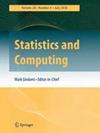Automated generation of initial points for adaptive rejection sampling of log-concave distributions
IF 1.6
2区 数学
Q2 COMPUTER SCIENCE, THEORY & METHODS
引用次数: 0
Abstract
Adaptive rejection sampling requires that users provide points that span the distribution’s mode. If these points are far from the mode, it significantly increases computational costs. This paper introduces a simple, automated approach for selecting initial points that uses numerical optimization to quickly bracket the mode. When an initial point is given that resides in a high-density area, the method often requires just four function evaluations to draw a sample—just one more than the sampler’s minimum. This feature makes it well-suited for Gibbs sampling, where the previous round’s draw can serve as the starting point.
自动生成对数凹分布自适应剔除采样的初始点
自适应剔除采样要求用户提供跨越分布模式的点。如果这些点远离模式,就会大大增加计算成本。本文介绍了一种简单的自动选择初始点的方法,该方法使用数值优化来快速包围模式。当给定的初始点位于高密度区域时,该方法通常只需进行四次函数求值即可提取样本,仅比采样器的最小值多一次。这一特点使它非常适合吉布斯采样,上一轮的采样可以作为起点。
本文章由计算机程序翻译,如有差异,请以英文原文为准。
求助全文
约1分钟内获得全文
求助全文
来源期刊

Statistics and Computing
数学-计算机:理论方法
CiteScore
3.20
自引率
4.50%
发文量
93
审稿时长
6-12 weeks
期刊介绍:
Statistics and Computing is a bi-monthly refereed journal which publishes papers covering the range of the interface between the statistical and computing sciences.
In particular, it addresses the use of statistical concepts in computing science, for example in machine learning, computer vision and data analytics, as well as the use of computers in data modelling, prediction and analysis. Specific topics which are covered include: techniques for evaluating analytically intractable problems such as bootstrap resampling, Markov chain Monte Carlo, sequential Monte Carlo, approximate Bayesian computation, search and optimization methods, stochastic simulation and Monte Carlo, graphics, computer environments, statistical approaches to software errors, information retrieval, machine learning, statistics of databases and database technology, huge data sets and big data analytics, computer algebra, graphical models, image processing, tomography, inverse problems and uncertainty quantification.
In addition, the journal contains original research reports, authoritative review papers, discussed papers, and occasional special issues on particular topics or carrying proceedings of relevant conferences. Statistics and Computing also publishes book review and software review sections.
 求助内容:
求助内容: 应助结果提醒方式:
应助结果提醒方式:


